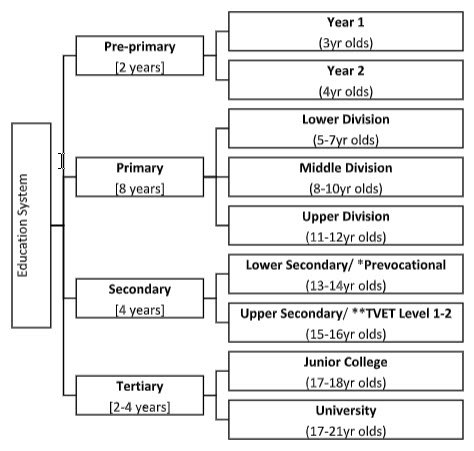Education System Overview
General Overview of Education System
Figure 1: Belize Education System

Additional Overview of Education System
Note: *Prevocational programs correspond to lower secondary level education. **Levels 1 and 2 trade programs correspond to upper secondary level education.
The system of education is governed by the Education and Training Act (ETA, 2010), the Education Rules 2003 and the Education (Amendment) Rules (EAR, 2012). Section 3 (1) of the ETA sets out the principles and philosophy by which the Ministry of Education is expected to operate:
“The Ministry, under the general direction of the Minister, shall work in partnership, consultation and cooperation with churches, communities, voluntary and private organizations, and such other organizations and bodies which the Ministry may identify and recognize as education partners for the sufficient and efficient provision of education in Belize.”
Three types of educational institutions operate in Belize—government, government-aided and private. Government schools are owned and funded by the Government of Belize. Government-aided schools are schools owned by either a religious denomination or community group that receive funding from the government through school services grants or direct payment of teachers’ salaries. Private schools are owned and funded by individual persons, denominations or private groups; a few of these schools are specially-assisted, which means they receive small grants from the government. All government and government-aided schools have Managing Authorities (Managers or Boards of Management) that oversee the operations of the school and work with school administrators to develop and enforce policies. Education is compulsory for children 5-14 years of age. Government and government-aided primary and secondary schools are tuition fee-free; however, they are allowed to charge special fees with the approval of the Chief Education Officer.
